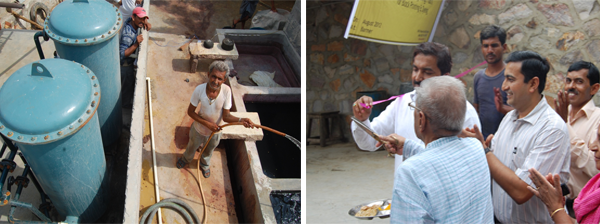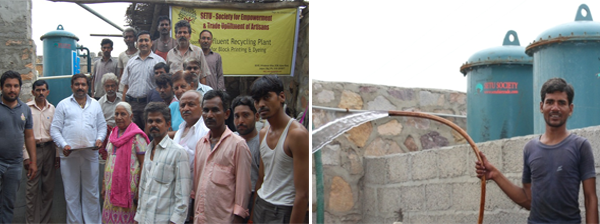Home / All Socio-economic Activities / Million Litre Water Saving Project
We are associated with artisans engaged in hand block printing of cotton fabric, especially in the desert areas of Rajasthan. This is their traditional art followed from generations and is their main source for livelihood. During printing of the fabric, ample quantity of water is being used & wasted depending upon the volumes. ( 5 ~20 million liters/ annum). This is a wastage of precious natural resources, especially in desert area, where clean water is accessible only after 2-10 kilometers. Due to scarcity of water and Govt. regulations, many units are being forced to shut down.To install a water treatment plant is a very expensive solution for small artisan groups & hence many ( in thousands) dyeing units are stopped & artisans are without any work.
SETU had studied the problem with artisan groups & worked towards developing a sustainable option to solve the above issues for last 6 months. Lab tests were done to identify the quantity & nature of all foreign material in the effulent water. Based on the analysis, with the help of our subject experts, we developed a custom machinery, specially suitable for our needs & capacity and that fits in a reasonable budget.
The plant was installed in the first week of August’2012 at Barmer. The filtered water is being used for fabric processing & the results have been quite encouraging. No detoriation in any property of dyed fabric was observed.

One lot of water can be recycled for about 15 times. The filtered waste is of solid nature & can be disposed off suitably.
This project has been a wholly sustainable effort, combining our people-positive and planet-positive values to help this artisan community. It helps achieve:
• Environment sustainability – conserves water and blocks effluents from being discharged into the land with waste water,
• Economical sustainability – saves money from purchasing and getting fresh water and increases work time efficiency, also retaining livelihood opportunities which are otherwise at risk with closure of units due to water scarcity & Govt. regulations.
• Social sustainability – allows the community to continue their traditional craftwork in a sustainable manner.

We are expecting a saving of minimum 5 million litres of water per annum. In addition to that it will save costs & land pollution.
SETU will observe the performance for next few months & then work on horizontally deploying the same for other dyeing units we are working with.